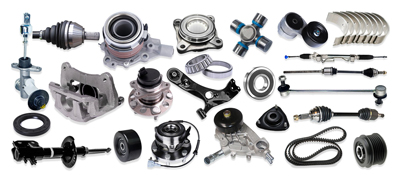The truck electrical system is a core component to ensure the normal operation of the truck, involving power supply from starting to various functions. Therefore, it is particularly important to understand these parts for repair and maintenance. The following are common parts of the truck electrical system, and we will explain them in detail.
- Battery
The battery is one of the core components of the truck electrical system. It is responsible for starting the engine and providing power to various electrical devices (such as lights, instruments, air conditioners, etc.). The battery stores and releases electrical energy through chemical reactions.
Notes:
Check the voltage and condition of the battery regularly.
Make sure the battery terminals are clean and firm.
- Alternator
The generator is responsible for converting the mechanical energy of the engine into electrical energy, providing continuous power to the truck’s electrical system and charging the battery.
Notes:
The belt of the generator needs to maintain proper tension.
The working condition of the generator will affect the charging effect of the battery, so check it regularly.
- Starter Motor
The starter motor is used to start the truck engine. It converts the electricity provided by the battery into mechanical energy and starts the rotation of the engine.
Note:
When starting, check if the starter motor makes any unusual sounds or behaves erratically.
Long-term use may cause the starter motor to wear out.
- Electrical Relays
Electrical relays are used to control high-power circuits to activate other components (such as lights, fans, etc.) through low-power circuits.
Note:
Check that the relay is working properly, especially in high-power circuits.
Relays may be damaged by excessive current or poor contact.
- Fuse
Fuse is a protective device to prevent circuit overload. When the current is too large, the fuse will melt and cut off the current, thus protecting the electrical system from damage.
Note:
Check fuses regularly for damage.
When replacing fuses, make sure to use replacements with the same specifications.
- Wires and Connectors
Wires and connectors transmit current from components such as batteries and generators to various parts of the truck. Their quality and the firmness of the connection directly affect the stability of the electrical system.
Note:
Wires should be checked regularly for wear, aging or short circuits.
Make sure the connectors are not corroded and are securely connected.
- Electronic Control Unit (ECU)
The ECU is a common electrical control module in modern trucks that regulates the operation of systems such as the engine and transmission.
Notes:
Check the ECU regularly for fault codes.
Make sure the ECU’s software and hardware are updated in a timely manner.
- Lighting System
The truck’s lighting system includes headlights, brake lights, signal lights, etc. These lights are powered by the electrical system to ensure that the vehicle is visible at night or in bad weather conditions.
Notes:
Check all lights regularly to see if they are working properly.
Replace damaged bulbs to ensure that the vehicle meets regulatory requirements.
- Air Conditioning System
The truck’s air conditioning system requires electricity to drive the compressor, fan and other components to ensure the temperature inside the vehicle is appropriate.
Notes:
Check that the power supply to the air conditioning system is stable.
Pay attention to the working condition of the air conditioning control module and motor.
- Electronic Devices
Modern trucks are equipped with many electronic devices, such as navigation systems, entertainment systems, sensors and alarm systems, which rely on the electrical system to provide a stable power supply.
Notes:
Regularly check the connection and function of these electronic devices.
Pay attention to the power distribution of the battery and generator to ensure that these devices do not affect the normal operation of the vehicle.
Summary
The electrical system of a truck involves multiple key parts, each of which plays a vital role. Regular maintenance and inspection of these parts can not only ensure the safety and stability of the truck, but also reduce the occurrence of unexpected failures. By understanding the functions and maintenance points of these basic parts, you can better take care of the truck’s electrical system and ensure its long-term stable operation. If there are other unclear questions, you are welcome to contact us at any time.

 Twitter
Twitter
 Facebook
Facebook
 Linkedin
Linkedin
 Google +
Google +



